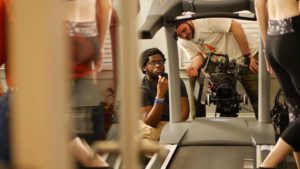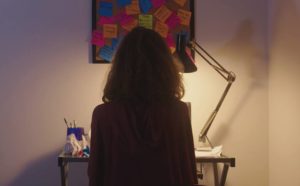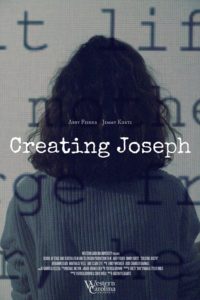
Lead actress Abby Fisher as “Chelsea” on set about to shoot a scene. Photo by set photographer Scott Wilson.
Films aren’t easy things to make. According to the new program director for Film & Television production, Joshua Russell, films are a sophisticated, populist art for people and by people in their ways of telling a compelling visual story.
Not everything in film makes it to their final cuts, and the Spring student thesis film “Creating Joseph” got some notable hits.
The film is about a writer, Chelsea, who has been on a frustrating streak of writer’s block who is willing to go to any lengths to get the story she wants to write, even at her own and others personal costs. For a more detailed description, watch this feature below:
The film was cut from its original 40 minutes down to 17. Four characters were cut from the film entirely, as well as reduced screen time for others. This can leave questions if the film has suffered due to its direction.
Did it suffer? How was “Creating Joseph” in the end, created?
There’s a process where students submit their scripts to the film faculty. Between March and April of every year, a committee within that department selects two films to become big productions.

Patricia Brown is still passionate about her script, albeit some disheartening setbacks.
I spoke with the original writer and producer of “Creating Joseph”, Patricia Brown. When asked about what she did for the film as a starting question, Brown chuckled and shook her head.
“What didn’t I do for ‘Creating Joseph’?” Brown mentioned with a hint of bitterness she couldn’t quite hide.
Brown originally wrote the script for the film as her final assignment in the Intro to Screenwriting class as a freshman. She largely put it on the backburner to focus on schoolwork over the years, but went back to it every now and again with tweaks until it was selected by the program her junior year to become a film. There still lies the question- why this story?
“I really enjoyed the script because it was a really simple story that was kind of about me being on writer’s block,” explained Brown. “So, it was about this girl on writer’s block, then it started to evolve into a girl in a relationship, a girl choosing ambition over love, a girl destroying her boyfriend/husband’s life to get this story out…which I feel a lot of people can relate to.”
Brown noted her exasperation with the rewriting process with the department after a while, as she felt the constructive criticism and notes she got from the Film professors about her script were “all over the place” and was being taken in a direction that she didn’t personally like. Brown spoke about how she had to filter where she would take the script and pick and choose between the ones she was more okay with.
After much distress over the direction of the script and increasing frustration, Brown was taken off her writing position.
“I had a talk with the professors and we kind of agreed they were wanting something from the story that I couldn’t really give them,” Brown explained. “I had been working on 30 rewrites at that point, I was getting exhausted with the project, and I felt – we all felt it needed a new set of eyes on it.”
Brown was at first distraught that the writing helm was taken away from her and that they were bringing in more people to look at the story since she had worked on it since freshman year. After some convincing with the department and her boyfriend, Austin Pleasants (also director of the film), she gave it up.
“This is how the real world works. You sell what you love, and then you work on the next thing.” Brown sighed, explaining she was pretty burned out from “Creating Joseph”. “It was upsetting, but at the same time I loved the way it turned out and I love where the characters are now…I think it’s a successful film.”
When Brown was stripped of the writing helm, a competition was held within the department to become the next writer(s) for the script. Brett O’Hara and Tyler Jones were selected and wrote 15 different versions of the script in the period between late October and January.
I spoke to writer, O’Hara, on how he felt about his characters being left out of the film during post production.
“It’s part of the game, that’s how I look at it. As a writer, you kind of always get shit on. Stuff that works on page isn’t always going to work on screen,” O’Hara said nonchalantly. “No hard feelings at all, though.”
“A lot of films end up leaving whole entire characters on the cutting room floor or even story threads,” said Joshua Russell, the new Film Program Coordinator.
Was the story affected negatively by the many changes? Why were there so many cuts to “Creating Joseph”?

Crew of “Creating Joseph” working hard to properly frame a scene in small spaces. Photo by Scott Wilson.
Upon seeing an unfinished version of the film, O’Hara spoke on how disjointed the narrative was compared to the original finalized script. O’Hara explained that the initial plot was affected by the condensing of film into a shorter version, so in the end the editing really makes the story.
However, according to Russell, “Creating Joseph” still has a full three-act structure intact even with all the changes and cuts.
“[Creating Joseph] is a very strong piece, and it’s challenging,” Russell glowed, “it’s a spectacular accomplishment.”
To explain the process of why so much was left out of “Creating Joseph”, Russell reinforced that this is a film made at a small college program within a film school. Russell added most people tend to forget that it’s a school to begin with meaning the work produced there is not perfect. Students are learning how to find their voice as a filmmaker and they aren’t at top notch quality yet, so it makes sense that there would be lot of film left on the cutting room floor.

Austin Pleasants, director, discussing the nature of the scene with the two leads, Fisher (left) and Kurts (right). Photo by Scott Wilson.
“Getting good (at filmmaking) is a sophisticated, complicated process,” Russell emphasized. “You’re creating an entire world with characters that have massive crises. You have to render these characters in a way that’s both compelling and authentic, and that’s really difficult stuff.”
Russell doesn’t think that a majority of the 8 hours of filming for this thesis are rookie mistakes. In fact, the reason why the film was 40 minutes to begin with was because of two major storylines one of Chelsea, the writer, and Miles, the boyfriend. Russell and Jack Sholder, the previous program coordinator and creator of the film program at WCU think incredibly highly of the student director for “Creating Joseph”, Pleasants, for going above and beyond.

Chelsea (Abby Fisher) is drawing blanks at her writing desk. Photo found on the Creating Joseph facebook page.
Russell commented that the film was always about the main character Chelsea, not her boyfriend Miles. “Creating Joseph” is a single character driven piece, and to Russell, any additional information about most other characters felt like a diversion. Thus, many characters had to get cut.
“The girl and her story was just so interesting, so dominating…you were so drawn into how she was going to create Joseph,” Sholder reflected.
Brown noted how impressed she was with the acting talent at Western.
“[Seeing Western actors get cut from the film] That’s probably what hurts the most. It’s not that characters were dropped, it’s that some of my good acting friends can’t be in this film and this experience.” Brown explained. “I don’t want to say for the best, but that’s how the story ended up… (it’s about) how you want the story to be in the end. The story just didn’t call for those characters.”
The only thing Brown wishes she could have changed about “Creating Joseph” is realizing sooner that she wasn’t fit to write the story. Because of that, she wishes that the other writers and even her own visions could have been more realized with more time.
“It still would have been just as heartbreaking to have written the entire (script), but like I said, it’s for the best,” said Brown.

Photo of Abby Fisher on set before her treadmill scene, where she runs to get her mind going on ideas but really just feels she’s running on empty. Photo by Scott Wilson.
Brown explained that short films are difficult but doable. She cited her concerns on how the tense time limits it might be hard to develop connections with characters in a 15-20 minute time frame. To be able to pull this off, to Brown, is “brilliant work”.
Why were these students constrained to such limits for their films? Largely, to get into film festivals.
If these films go above 11-15 minutes, it limits the exposure and ultimately the recognition it gets. Festivals can only schedule so much within their time blocks, and some often choose smaller 3-4 minute films because that means more attendance and more films to show overall. Even if an amazing short film is 11-20 minutes, it could get turned away from the festival due to its length. It must be impeccably good to be accepted.
It used to be up to students to send their films off to festivals, but now the entire program is shifting in some big ways and is focusing around getting students to win for their films at film festivals. The goal for the new programs brought in by Russell is for more students to win at festivals and more films to be festival standard. For more information on the future of the film program, read our article on the Western Carolina Journalist.

Patricia Brown, ready for her brief cameo in “Creating Joseph”. Photo by Scott Wilson.
Even after this production of “Creating Joseph”, Brown still wants to delve further into her story she’s worked on for so long and hopes to make it into a feature one day. Brown ended up with a story credit for the film in the end, but hopes to take her script in her own direction at some point.
“I think ‘Creating Joseph’ would make for a great feature film and that it would make sense to be longer,” Brown articulated. “This is a story that needs to be told because it touches, I feel, writers in different ways… [to have] the inner strength and inner guts to be able to pour your heart out into something…not just mental, but physical [for your story].”
O’Hara would like the film to become a feature at some point, but is skeptical of it being accomplished at Western.
“I think it would help to focus a little more on each character. We’re kind of constrained with what we can do with the budget…I feel that script could be a feature length script, but honestly it’s impractical, since we’re in a college program.” O’Hara commented.
“[When asked about “Creating Joseph” possibility of being a feature] I never really thought about it,” commented Sholder. “If somebody at Warner Bros. saw it and said ‘God, we love this, can you make this into a feature’ they’d figure out a way.”
Russell stated that he thinks “Creating Joseph” absolutely has the necessary drama to be made into a feature film, and that there would be potential for it.
When asked if there was anything Russell would change about the process of “Creating Joseph”, he mentioned his hope for creating a more elegant pre-production process within the thesis program, and teaching students better how to shoot on location in a way that isn’t disruptive to their respective communities. He wants to teach his students how to engage in the community in thoughtful, kinder ways so that when they dominate a space to shoot a film they don’t upset their owners.
When asked if he would change anything about the process of “Creating Joseph”, Sholder said no. The process is the process, and those who worked it must learn from their actions, according to Sholder.

Official poster for “Creating Joseph”. Found on Controlled Chaos’s Facebook page.
Perhaps things could have been different, but it is clear the common consensus is that “Creating Joseph” could very well be one of the best films the department has produced.
Only time will tell when it appears at the ninth annual Controlled Chaos in the Bardo Arts Center on Friday, April 28 at 7 PM.
The purpose of the event is to celebrate select films produced in the Film and Television Production program at Western Carolina University, including Fall thesis “Around & Around”.
Tickets are $12 at the door and $14 online, and proceeds and donations benefit the Motion Picture Student Project Fund, which helps fund student thesis films for in WCU’s Film and Television Production Program.



